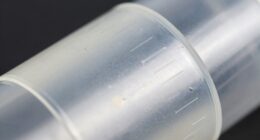Celery juice can feel like a miracle cure for your liver! It's packed with nutrients like vitamin K and potassium, which support liver detoxification and overall health. Its anti-inflammatory properties help reduce stress on your liver while enhancing blood flow. Plus, it's low in calories, making it a smart choice. But there's more to discover, including potential downsides and how to best include it in your diet for maximum benefits.
Key Takeaways
- Celery juice supports liver health by containing anti-inflammatory flavonoids and essential nutrients like vitamin K and potassium.
- Natural nitrates in celery enhance blood flow to the liver, improving its overall function and efficiency.
- The high water content in celery juice aids hydration, which is crucial for the liver's detoxification processes.
- While beneficial, juicing removes fiber, so pairing celery juice with whole foods ensures comprehensive liver support.
- Claims of celery juice as a miracle detoxifier are misleading; the liver naturally detoxifies without needing excessive juice consumption.
Benefits of Celery Juice
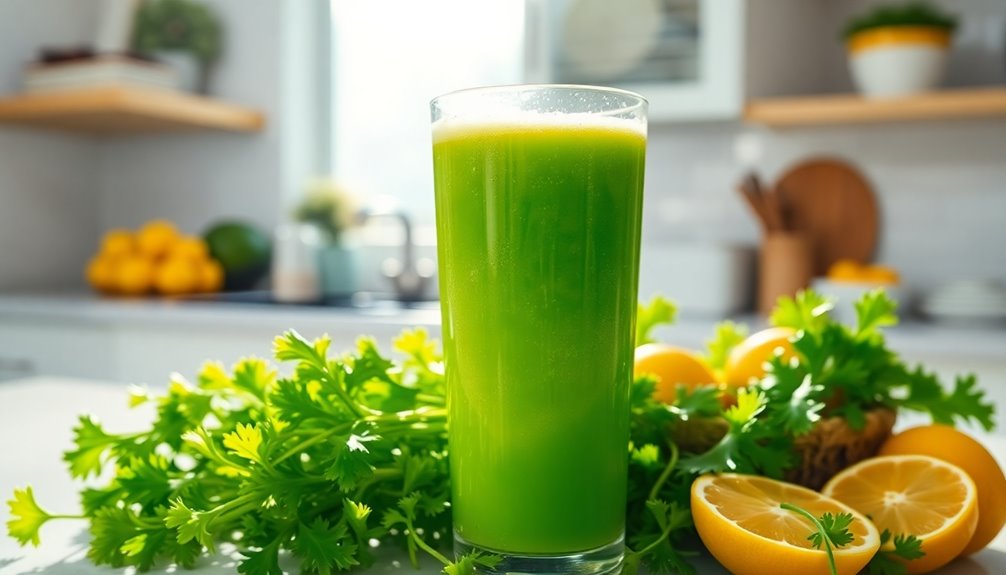
When you start incorporating celery juice into your diet, you may notice a range of benefits that support your liver health.
The health benefits of celery are impressive, especially its anti-inflammatory properties. One serving packs a punch with 781 mg of potassium, essential for proper liver function.
Plus, the natural nitrates in celery can help lower blood pressure, indirectly boosting blood flow to your liver. This hydrating, low-calorie juice—only 50 calories per serving—makes a great addition to your diet.
Flavonoids found in celery juice work to reduce inflammation, promoting overall liver wellness.
What Is a Celery Juice Cleanse?
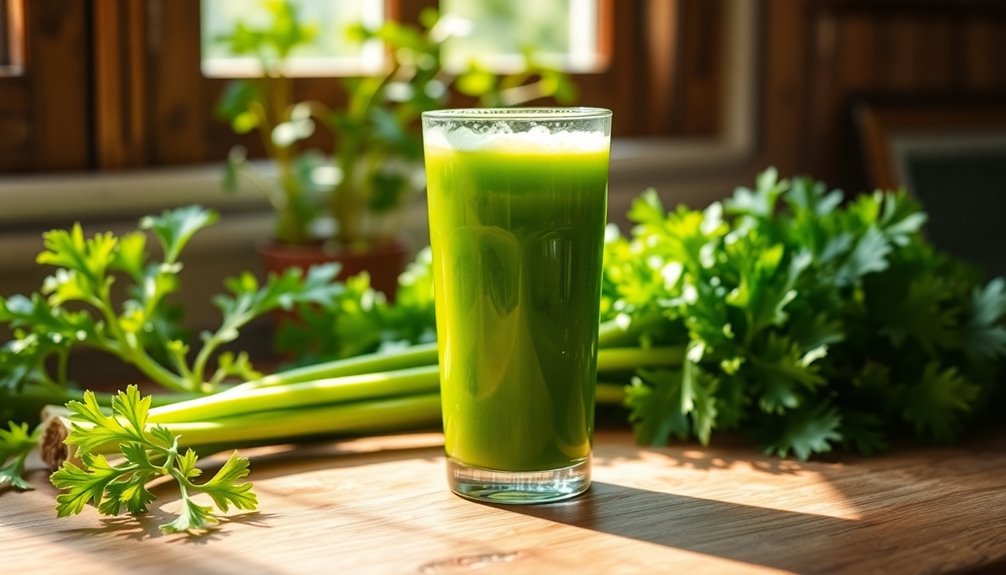
Celery juice cleanses have gained popularity as a way to purportedly detoxify the body and support liver health. Typically, you'll consume large amounts of celery juice while eliminating solid foods for a short period.
Many people turn to these juice cleanses, hoping for quick health benefits, but health professionals often caution against them. Prolonged juice cleanses can lead to fatigue, dehydration, and irritability.
While short-term cleansing mightn't pose significant risks, remember that celery juice shouldn't replace meals. Instead, consider incorporating whole celery into your diet for added fiber and nutrients.
This approach offers better support for your liver health and overall well-being, making it a smarter choice than relying solely on juice.
Nutritional Composition of Celery Juice

Packed with essential nutrients, celery juice offers a variety of health benefits that can support liver function and overall wellness.
A 10-ounce serving contains just 50 calories, making it a low-calorie beverage option. You'll find a wealth of vitamins and minerals, including 90 mcg of vitamin K, 110 mcg of folate, and 781 mg of potassium.
With its high water content, celery juice promotes hydration, which is crucial for your liver's efficiency. Additionally, this juice is rich in antioxidants from beneficial phytochemicals like flavonoids, helping to reduce inflammation.
While juicing concentrates these nutrients, remember it removes fiber, so consider consuming whole celery for maximum nutritional benefits.
Enjoy this invigorating drink and support your health!
Celery Juice and Liver Health

Rich in antioxidants and nutrients, celery juice can play a significant role in supporting liver health. Here are four key benefits you'll enjoy:
- Antioxidant Power: Celery juice is packed with flavonoids that help reduce inflammation, promoting overall liver health.
- Natural Nitrates: These compounds may enhance blood flow to the liver, aiding its function.
- Vitamin K: This essential vitamin supports liver detoxification processes and metabolic health.
- Hydration Boost: Staying hydrated with celery juice can help your liver effectively process and eliminate toxins.
Incorporating celery juice into a balanced diet may enhance your liver's ability to detoxify, making it a worthwhile addition to your wellness routine.
Downsides of Drinking Celery Juice
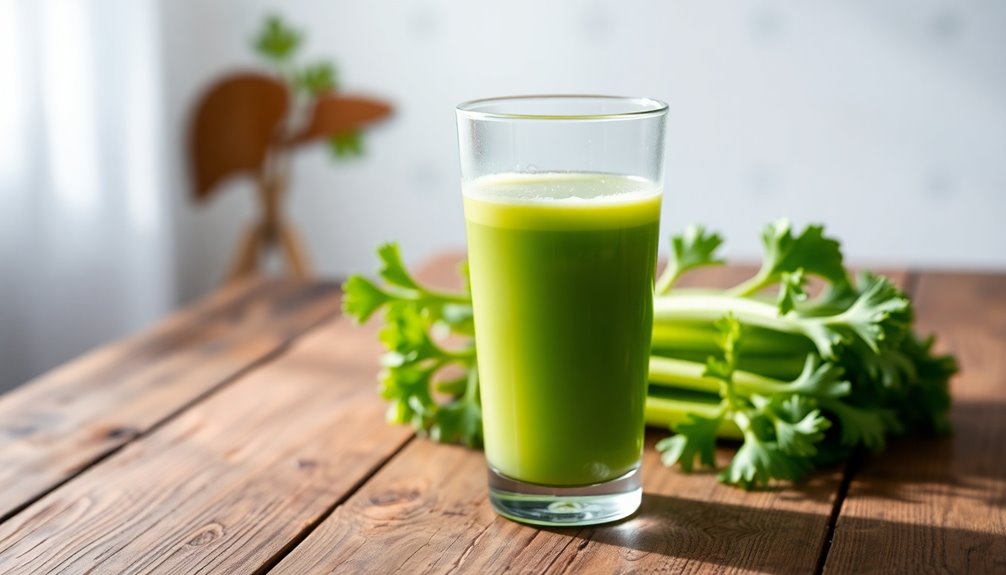
While many people embrace celery juice for its purported health benefits, it’s important to reflect on the downsides that can accompany regular consumption. One significant downside is that consuming large amounts of celery juice can lead to increased sodium intake, which may cause issues for individuals with high blood pressure. Additionally, relying solely on celery juice for nutrition may result in deficiencies of essential vitamins and minerals found in a wider variety of foods. Therefore, while many seek the celery juice health benefits explained through various health claims, it’s essential to maintain a balanced diet and consult with a healthcare professional before making it a staple in your routine.
Juicing celery removes much of its fiber, which is essential for digestion and blood sugar regulation, potentially leading to increased cravings. Many commercially available juices contain added sugars, undermining their health benefits.
Although touted as a detoxifying agent, your liver already detoxifies naturally without the need for juice. Excessive celery juice can increase phytochemical intake, posing unknown risks due to unclear ideal dosages.
If you're on blood thinners, be cautious; the high vitamin K content in celery juice can interfere with your medication's effectiveness. Always weigh the potential side effects against the benefits. Additionally, be mindful that high water content in celery juice may lead to increased urination, which could further impact hydration levels.
Celery Juice vs. Whole Celery
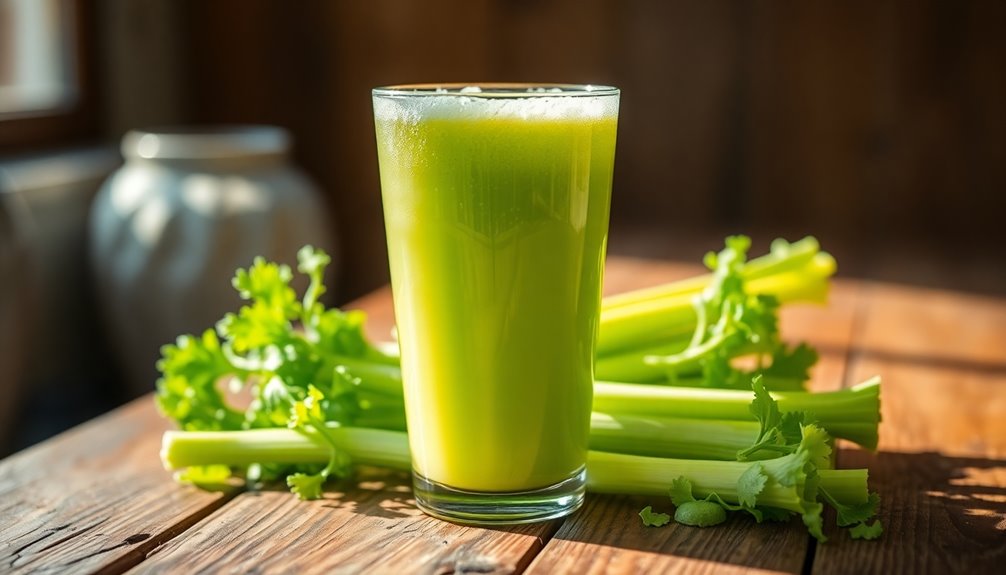
When comparing celery juice to whole celery, you'll notice key differences in nutrient density and fiber content.
While juice packs a concentrated dose of vitamins and minerals, it lacks the dietary fiber that whole celery provides, which is essential for digestive health.
Understanding these differences can help you decide which form is best for your health goals.
Nutrient Density Comparison
Many people wonder about the nutrient density of celery juice compared to whole celery. Here's a quick comparison to help you understand:
- Fiber Content: Whole celery contains about 2 grams of fiber per cup, essential for gut health.
- Vitamin K: A 10-ounce serving of celery juice offers 90 mcg of vitamin K, but lacks the broader range of nutrients found in whole celery.
- Concentration: Juicing concentrates vitamins and minerals, making it easier to consume more nutrients in less volume.
- Antioxidants: Whole celery provides antioxidants and anti-inflammatory properties that may diminish in juice form.
While celery juice is hydrating and low in calories, it doesn't match the nutrient density and health benefits of consuming whole celery. Additionally, celery juice supports liver function due to its anti-inflammatory properties, promoting overall health.
Fiber Content Difference
Although you might enjoy the invigorating taste of celery juice, it's important to recognize the significant difference in fiber content between celery juice and whole celery. When juicing celery, much of the fiber is removed, which can impact your health. Whole celery offers about 2 grams of dietary fiber per cup, while celery juice has only 0.5 grams per 10-ounce serving. This lack of fiber can lead to increased cravings and less effective appetite control, making weight loss more challenging. Whole celery also provides insoluble fiber that helps reduce inflammation and lowers the risk of health issues like type 2 diabetes and heart disease.
| Item | Fiber Content (grams) | Benefits |
|---|---|---|
| Whole Celery | 2 | Satiety, blood sugar control |
| Celery Juice | 0.5 | Limited appetite control |
| Whole Grains | Varies | Weight loss, gut health |
| Fiber Source | Essential | Reduced health risks |
| Nutritional | Balanced | Retains phytochemicals |
Digestive Health Impact
While you might be drawn to the invigorating taste of celery juice, it's essential to understand how it affects your digestive health compared to whole celery. Here are some key points to reflect on:
- Whole celery provides insoluble fiber, fundamental for regular bowel movements.
- Celery juice lacks fiber, which can lead to reduced satiety and potential digestive issues.
- The concentrated sugars in celery juice may spike blood sugar levels, unlike the balanced effect of whole celery's fiber.
- Whole celery's antioxidants, including flavonoids, support digestive health more effectively than juiced versions.
- Including natural remedies like whole celery in your diet can enhance overall digestive health and complement other dietary choices.
Incorporating whole celery into your diet is a better choice for enhancing digestive health, keeping blood sugar stable, and reaping the full benefits of its fiber and antioxidants.
Evidence-Based Insights on Celery Juice Claims

When you hear claims about celery juice boosting liver function, it's important to approach them with a critical eye.
While it does contain beneficial nutrients, the evidence suggests that the liver's detoxification abilities don't rely on juice supplements.
Let's explore how these assertions stack up against scientific understanding of nutritional value and liver health.
Misleading Health Assertions
Many people are drawn to the idea that celery juice can detoxify the liver and enhance its function, but these claims often lack scientific backing. Consider these points:
- The liver naturally detoxifies the body without any juice.
- No scientific evidence supports juicing for improved liver function.
- Anecdotal testimonials can mislead, as they often omit other lifestyle changes.
- Relying solely on celery juice for liver health is misguided; whole foods provide essential nutrients.
While celery juice might fit into a healthy diet, it's essential to evaluate these misleading health assertions critically. Regular exercise can also play a significant role in supporting liver health and overall well-being.
A balanced diet is key for overall health, and putting faith in juicing alone may not lead to the benefits you seek.
Nutritional Value Comparison
Celery juice boasts a variety of essential nutrients that can benefit your health, but its nutritional profile often raises questions about its overall value compared to whole celery.
While a 10-ounce serving of celery juice provides 90 mcg of vitamin K and 781 mg of potassium—key for liver function and muscle health—it lacks the fiber found in whole celery, vital for digestive health.
Additionally, although celery juice contains minerals and antioxidants like flavonoids, the juice form may diminish their concentration. Moreover, the process of juicing can also lead to the loss of dietary fiber, which is crucial for digestive health. While celery juice does offer some vitamins and minerals, those seeking the full range of benefits should consider consuming whole celery to maximize nutrient intake. Ultimately, the benefits of fresh celery juice may be overshadowed by the loss of important compounds necessary for overall wellness.
With only 50 calories per serving, you might think it's a miracle cure, but scientific evidence suggests that whole celery offers a more thorough approach to liver health, supporting natural detoxification processes more effectively.
Recommendations for Incorporating Celery Juice Into Your Diet
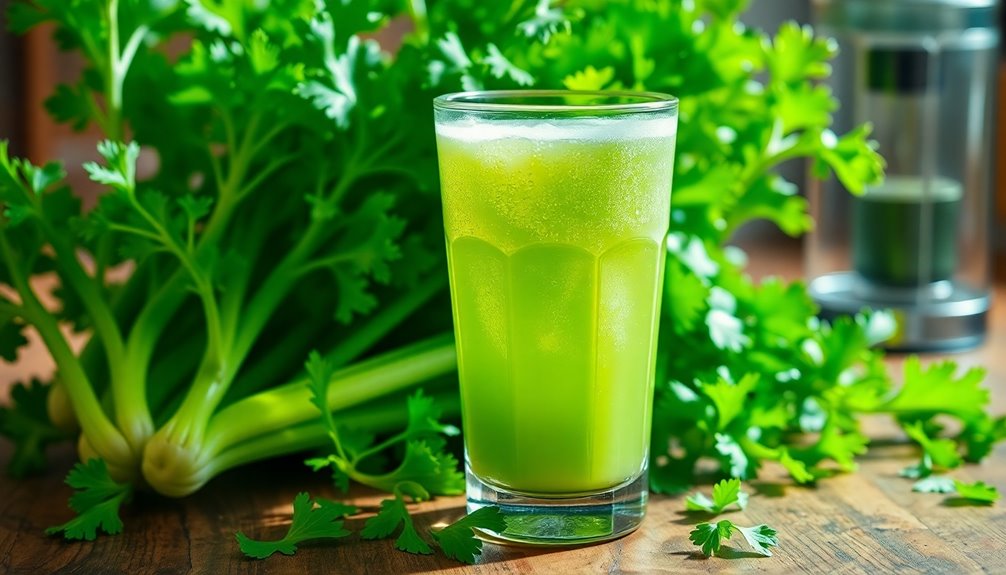
Incorporating celery juice into your diet can be a revitalizing way to boost your liver health and digestion. Here are some recommendations to get you started:
- Start your day with 8 to 16 ounces of fresh celery juice on an empty stomach to maximize benefits.
- Pair your celery juice with whole foods rich in fiber, healthy fats, and proteins for balanced nutrition.
- Use organic celery to minimize pesticide exposure and enhance nutrient content.
- Limit consumption to about 1 cup per day to avoid excessive sugar intake.
Frequently Asked Questions
Can Celery Juice Heal Your Liver?
Celery juice isn't a magical cure for liver issues, but it can support your liver health.
You'll benefit from its natural nitrates, which help improve circulation and may relax your blood vessels. The antioxidants and anti-inflammatory properties work to reduce oxidative stress, promoting overall liver function.
Plus, staying hydrated with celery juice aids in detoxification.
Just remember, it's best to combine it with a balanced diet for ideal results.
What Are Three Disadvantages of the Celery Juice Diet?
You might think sipping celery juice is a healthy choice, but it's got its downsides.
First, cutting out solid foods can lead to nutrient deficiencies over time.
Second, juicing strips away fiber, which is essential for gut health and keeping you full.
Ultimately, relying solely on celery juice can leave you feeling fatigued and irritable due to dehydration.
It's better to find a balanced approach to your diet for overall well-being.
What Not to Mix With Celery Juice?
When you're enjoying celery juice, avoid mixing it with high-sugar juices, dairy products, alcohol, and high-fat foods.
These combinations can spike your blood sugar, cause digestive discomfort, hinder liver detoxification, and slow down nutrient absorption.
Stick to pure celery juice for the best benefits. If you want to enhance the flavor, consider adding some lemon or ginger instead.
Keeping it simple helps you maximize the health benefits of this invigorating drink!
What Organs Does Celery Juice Help?
Celery juice helps several organs in your body.
It's particularly beneficial for your heart, as its natural nitrates can relax blood vessels and improve circulation.
Your liver also reaps rewards from the antioxidants and hydration celery juice provides, supporting detoxification and reducing inflammation.
Plus, it aids your kidneys by promoting healthy fluid balance.
Drinking celery juice regularly can contribute to overall organ health and enhance your body's natural functions.
Conclusion
Incorporating celery juice into your diet may offer surprising benefits for your liver and overall health. Did you know that studies suggest celery juice contains powerful antioxidants that can help reduce inflammation? While it's not a miracle cure, adding this vibrant drink to your routine can be a revitalizing way to support your wellness journey. Just remember to balance it with whole foods and consult with a healthcare professional to maximize its benefits. Cheers to your health!
Cindy thoroughly researches juicing trends, techniques, and recipes to provide readers with practical advice and inspiration. Her writing style is accessible, engaging, and designed to make complex concepts easy to understand. Cindy’s dedication to promoting the advantages of juicing shines through her work, empowering readers to make positive changes in their lives through the simple act of juicing.










